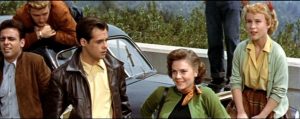Rebel Without A Cause
 Native Hoosier James Dean made just three films. And while East of Eden and Giant are certainly very good pictures, Nicholas Ray’s Rebel Without a Cause is Dean’s classic. Deftly expressing the teen angst of the purportedly homogenous and saccharin 1950s, Ray set his film in suburban America rather than the more common urban framework. While Rebel was a hit with younger audiences, older viewers were startled that such depression and emotional confusion could exist within the carefully constructed foundation of post-war suburbia. As the teen suicide rate climbed throughout the decade, many wrote off Rebel as an overstatement of a minor issue affecting only a tiny slice of suburban teens. It is this tragic misreading of Ray’s cinematic warning that makes Rebel hold up as one of the best films of the 1950s, even if some of the dialogue seems stilted and dated.
Native Hoosier James Dean made just three films. And while East of Eden and Giant are certainly very good pictures, Nicholas Ray’s Rebel Without a Cause is Dean’s classic. Deftly expressing the teen angst of the purportedly homogenous and saccharin 1950s, Ray set his film in suburban America rather than the more common urban framework. While Rebel was a hit with younger audiences, older viewers were startled that such depression and emotional confusion could exist within the carefully constructed foundation of post-war suburbia. As the teen suicide rate climbed throughout the decade, many wrote off Rebel as an overstatement of a minor issue affecting only a tiny slice of suburban teens. It is this tragic misreading of Ray’s cinematic warning that makes Rebel hold up as one of the best films of the 1950s, even if some of the dialogue seems stilted and dated.
James Dean stars as Jim Stark, an older teen navigating a new high school, whose constantly argumentative parents don’t seem to have the time or energy to invest in their son’s life. Jim’s father Frank (a young Jim Backus) is a particular disappointment, as his acquiescent nature forbids him from effectively accosting his mother. Jim is confronted by a group of school bullies on his first day, one of whom challenges Jim to a game of “chicken,” in which the two participants race two stolen cars to the edge of a cliff. The last to jump out of his car is the winner. Unfortunately, the bully’s jacket becomes stuck in the door handle, plunging him to his death. And so we are immediately thrown into a dark and decaying world of disturbed teens and their non-traditional family settings.
I love several directorial choices Ray made (and no, he’s no relation to me). First, the film opens in a police station. Three teens have been brought in for various minor infractions. Dean’s character is one of them. That night he meets young teen Plato (played by Sal Mineo), and Judy (played by Natalie Wood). The three eventually become friends at school. Why is this setting important? First, we are introduced to the three major players right up front, and more importantly, the police station setting signals that these are not the “good” kids. After all, the cheerleaders, football players, and marching band members typically do not spend time at the police station, or so the stereotype goes.
Later, we learn the family backgrounds of Jim, Plato, and Judy. Jim feels unwanted and unappreciated. Plato is being raised by a single mother who works odd hours. Judy’s father (William Hopper) doesn’t notice her anymore, causing her to dress “like a dirty tramp,” as he intones. Eventually, Jim and Judy become an item, and Plato idolizes Jim. This set-up may sound like a recipe for a disastrously dispirited drama, but Rebel Without a Cause is anything but. Still able to chronicle teenage apprehension over 60 years after its release, Rebel stands as one of the most important films of the 1950s.
Another directorial choice I adore is the early class field trip to Griffith Observatory in Los Angeles. The class views a short film on the pending destruction of our planet, as it grows into a so-called red giant, before its inevitable extinction. While these changes are still millions of years away, the narrative metaphor created by this scene sets up most of the subsequent action of the film. The television program “The Wonder Years” used this technique to humorous effect when young Kevin Arnold’s dry science teacher would show films of wildlife inadvertently paralleling Kevin’s present state of mind.
Part of the mystique of Rebel Without a Cause is the unintentional tragic deaths of the three major actors. James Dean perished in an automobile accident just prior to the film’s release in October, 1955 – a fact that always renders the game of chicken all the more horrifying. Sal Mineo was stabbed to death in 1979. And Natalie Wood drowned in 1981. Rebel is also noteworthy as the first major role for a teenager named Dennis Hopper (no relation to William), who would go on to fame as a writer, director, and star in 1969’s Easy Rider, and then later in the 1980s.
Fortunately, the Indianapolis Museum of Art is showing Rebel Without a Cause on Friday, June 17th, as part of their annual outdoor summer film series. These showings often sell out, so get your tickets soon if you want to understand James Dean’s charisma, and see one of the top films of the 1950s.
Andy Ray’s also serves as a film historian for http://www.thefilmyap.com/